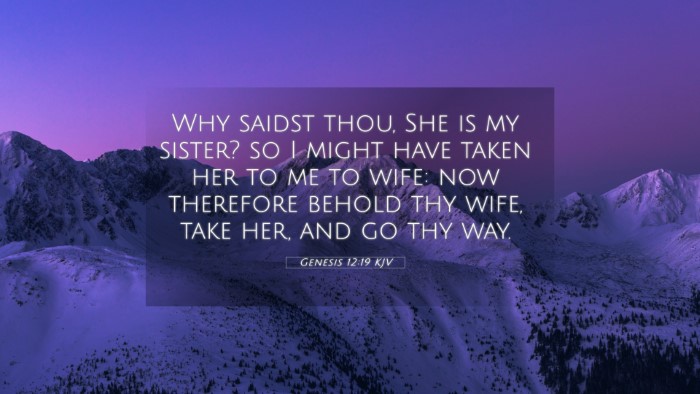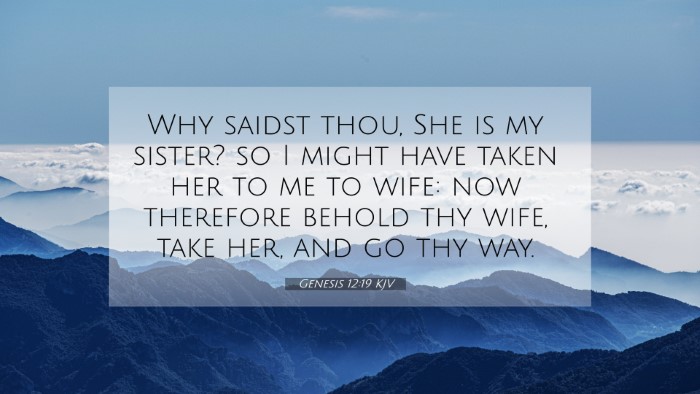Understanding Genesis 12:19
Genesis 12:19 presents a crucial moment in the life of Abraham as he encounters challenges during his journey to Egypt with his wife Sarai. To grasp the full meaning of this verse, it's essential to extract insights from respected public domain commentaries, which illuminate the passage through various theological lenses.
Verse Text
Genesis 12:19: "Why saidst thou, She is my sister? so I might have taken her to me to wife: now therefore behold thy wife, take her, and go thy way."
Commentary Insights
Matthew Henry's Commentary
Henry emphasizes the importance of honesty and the moral implications of Abraham's actions in Egypt. He highlights that Abraham's deception regarding Sarai's identity as his sister, rather than his wife, was an act of fear that led to dire consequences. This verse illustrates how Abraham’s lack of faith in God's protection can lead to complex situations impacting not only himself but also those around him.
Albert Barnes' Notes
Barnes elaborates on the motivations behind Abraham's deceit. He notes that Abraham attempted to protect himself in a foreign land by misrepresenting his wife. This behavior sheds light on human vulnerability and the temptation to rely on one's cunning instead of unwavering faith in God's promise. Barnes points out that God's intervention was necessary to prevent further complications, emphasizing divine sovereignty amid human frailty.
Adam Clarke's Commentary
Clarke delves into the cultural context of the time, noting that it was common for individuals to protect themselves by altering the truth. He explains the consequences of such actions and highlights how God intervenes to uphold Abraham's lineage and promise. Clarke's insights underline the paradox of Abraham, a man of faith faltering under pressure while paradoxically being the chosen vessel for God's covenant.
Thematic Connections
Genesis 12:19 serves as a critical intersection for various biblical themes and can be cross-referenced with numerous other scriptures to explore deeper meanings:
- Genesis 20:2: Abraham again lies about Sarai being his sister.
- Romans 4:20-21: Highlights Abraham's faith in God's promises despite circumstances.
- Hebrews 11:9: Acknowledges Abraham's faith while living in a foreign land.
- Proverbs 29:25: Fear of man brings a snare, relating to Abraham's fearful actions.
- Genesis 13:2: Shows God's blessings on Abraham despite his failings.
- 1 Peter 3:6: Sarai’s example of obedience reflects the dynamics of their relationship.
- Psalm 105:14-15: God's protection over His chosen figures, reinforcing His faithfulness.
- Exodus 14:14: A reminder of God's deliverance when faced with peril, relating to Abraham's fear.
- Job 13:15: A testament to maintaining faith under pressure, paralleling Abraham's dilemma.
- Psalm 127:1: Emphasizes the importance of God's involvement in protecting and building households.
Key Themes in Genesis 12:19
This verse underscores several key themes relevant for deeper biblical study:
- Moral Failure: The ethical dilemma and human imperfection displayed by Abraham.
- Divine Sovereignty: God's intervention amidst human failure showcases His ultimate control.
- Faith vs. Fear: The conflict between believing God's promises and succumbing to fear.
- Protection of God’s Covenant: God's commitment to preserving the lineage of Abraham.
- Interpersonal Relationships: Reflects the dynamics of trust and communication in marriage.
Connecting with Other Bible Verses
To gain a comprehensive understanding of Genesis 12:19, the following connections between Bible verses are important:
- Taking cue from Genesis 20:12, where Abraham makes a similar claim, we see a pattern of fear influencing his decisions.
- Matthew 10:28 reminds believers to fear God rather than man, resonate strongly with Abraham's dilemma in Genesis.
- Philippians 4:6-7 teaches the importance of surrendering anxiety to God, contrasting with Abraham's fearful choices.
- James 1:26 calls out the importance of bridling one’s tongue, relevant to the deceptions depicted in Genesis 12:19.
Conclusion
Understanding Genesis 12:19 requires examining the complex interplay of fear, deception, and faith within the narrative of Abraham's life. Through cross-referencing with other scripture, believers can see the multifaceted applications of this text, emphasizing that even the most faithful can falter. The implications of this passage extend beyond historical context, inviting readers to reflect on their own faith journeys and the importance of truthfulness in their relationships.
Further Study Suggestions
For those interested in exploring more about cross-referencing biblical texts, here are some suggested tools:
- Bible Concordance: Utilize a concordance for thorough word studies.
- Online Bible Reference Resources: Access tools that provide cross-reference capabilities.
- Bible Chain References: Explore thematic connections through structured chains of verses.
- Comparative Bible Study Methods: Engage in in-depth studies that compare various scriptures.


